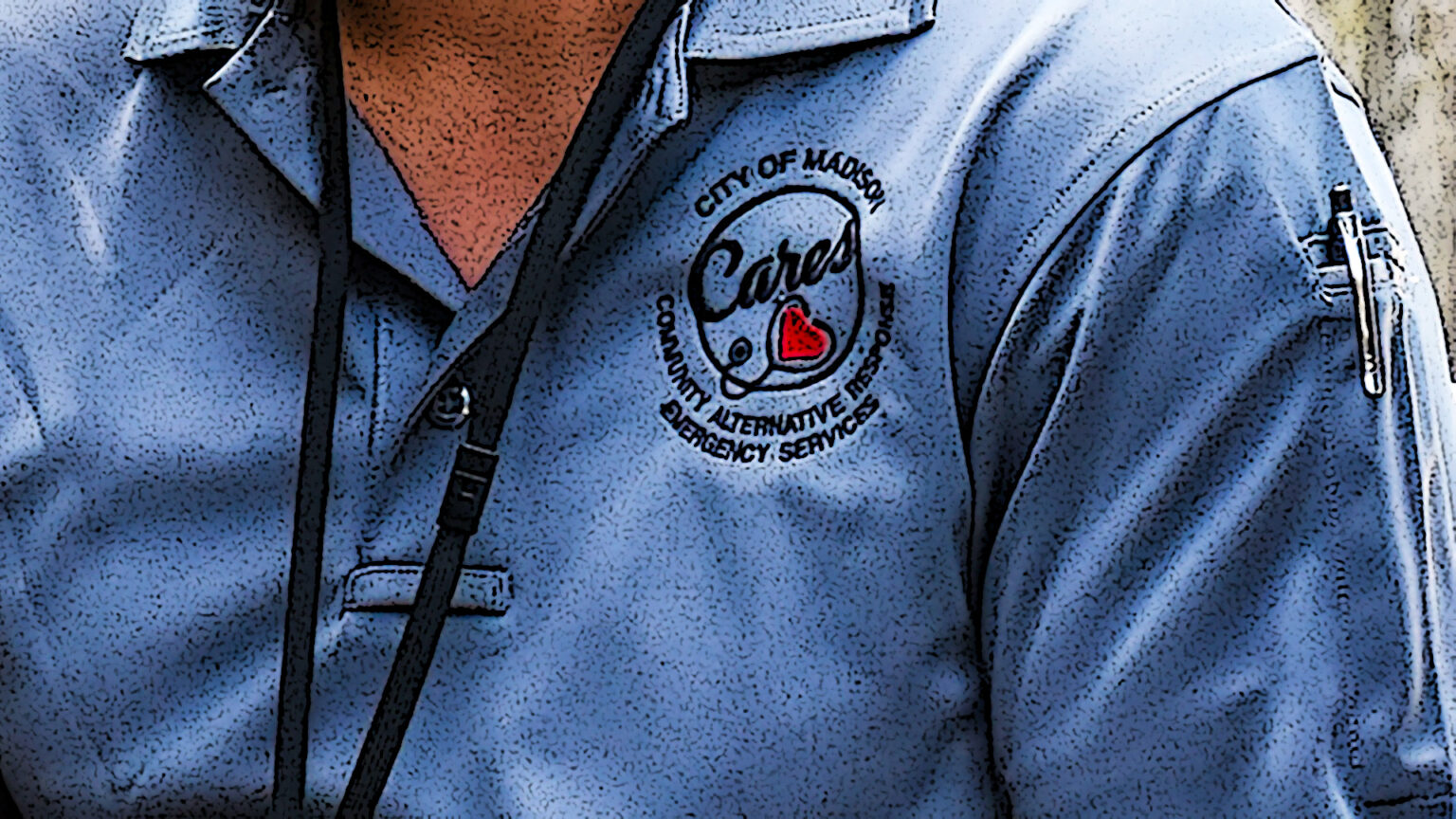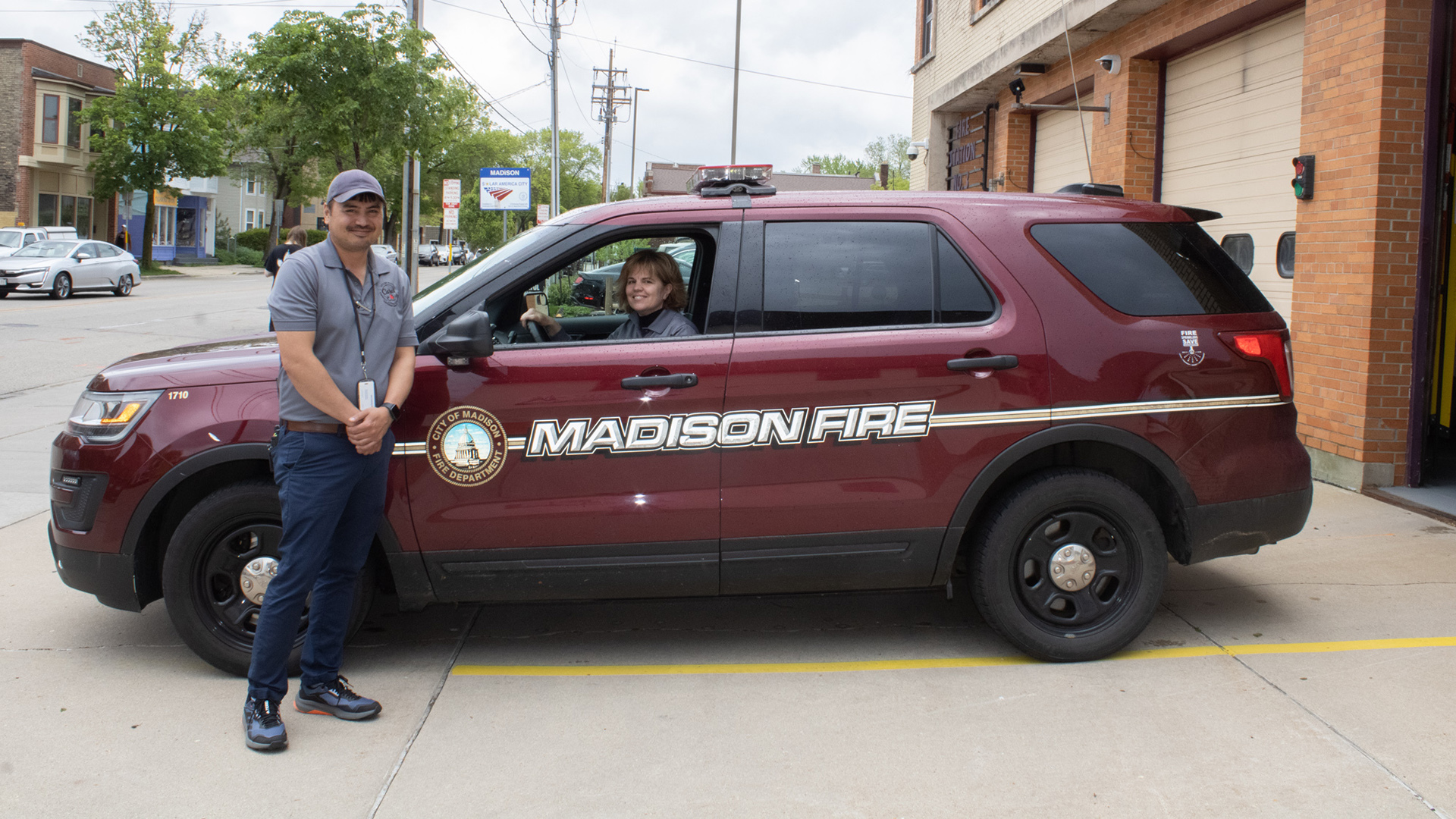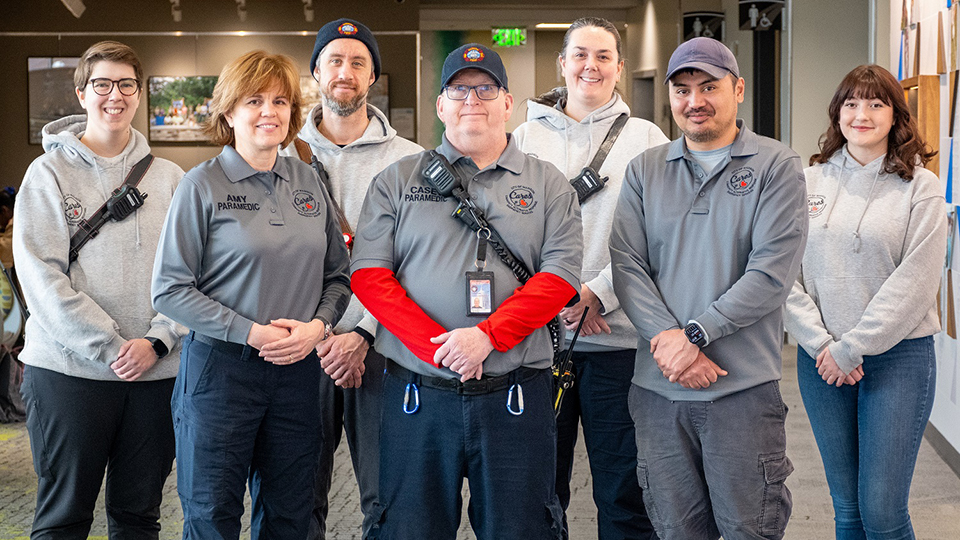Madison CARES strives to provide relief to people in mental health crises
Over nearly three years, a Madison-based program that offers aid to people experiencing mental health crises while reducing fraught encounters with law enforcement expands its reach and impact.
By Hannah Ritvo
May 23, 2024 • South Central Region

A photo illustration shows the logo of the city of Madison's Community Alternative Response Emergency Services, or CARES, program logo on the shirt of one its team members while out in the field. (Source: Madison Fire Department)
Warning: This story reports on issues of mental health and suicide.
When a person is in the midst of experiencing a mental health crisis, an encounter with police can be intimidating, frightening and potentially dangerous. In Madison, a relatively new type of first responder program is trying to reduce risks related to these encounters.
The city’s Community Alternative Response Emergency Services program, called CARES, was founded in 2021 to reduce direct police responses to mental health crises, replacing officers with trained crisis workers and community paramedics. CARES operates as a partnership between the Madison Fire Department and Journey Mental Health, and aims to assess and respond to individuals when they experience mental health crises.
Dispatched by the Dane County Public Safety Communications Center in response to a 9-1-1 call, a two-person CARES team works to de-escalate crises, connect individuals with resources and create safety plans.
The CARES fleet is composed of three vans that are stationed at two fire stations around Madison, each with “Madison Fire Department” labels on their sides. Trunks are filled with supplies that might come in handy during calls, including emergency blankets, water bottles, medications and food.
CARES team employees are equipped with tools and training intended to provide relief for people in mental health crises. Each paramedic and crisis worker is trained to have a foundational knowledge of mental illnesses and effective crisis intervention.
“Helping people is my forte,” said Eric Kinderman, a CARES crisis worker that has worked for the program since 2022. “I’m a survivor of suicide — I’ve lost family to it, so I have a personal tie.”
Kinderman has been working to help alleviate personal crisis situations since he was 18. Throughout college, he worked for the first crisis care center in Wisconsin — Jackson House Crisis Stabilization Center in Rock County — before starting with the crisis unit at Journey Mental Health.
“We train the team in suicide-risk assessment, safety and de-escalation,” said Sarah Henrickson, the clinical team manager of CARES crisis workers at Journey. “CARES workers are incredibly skilled and empathetic, and just really awesome at responding to people in crisis.”
Across the United States, there are growing concerns that law enforcement is not an optimal resource to help individuals experiencing mental health crises and the people around them.
“Even the most well-trained police officer who is very empathetic, trauma-informed, gentle and kind is still representative of the institution of law enforcement,” said Henrickson, who added that it can be triggering for somebody in the midst of a crisis to encounter police officers in uniforms with guns.
That’s why CARES doesn’t respond in military-style uniforms or with guns. They wear gray polo shirts with the CARES logo, and although their Madison Fire Department vans are equipped with a light rack and sirens, they are rarely used.
CARES paramedic Amy Yelk Meinholz said oftentimes when individuals in crisis realize these first responders aren’t police, their whole demeanor changes.
“They may have this preconceived notion, or they have personal experience that was not positive with law enforcement,” she said.

Eric Kinderman, a Madison CARES crisis worker, stands next to a Madison Fire Department vehicle driven by Amy Yelk Meinholz, a Madison CARES paramedic, outside Madison Fire Station #3 at 1217 Williamson St. on May 7, 2024. The Community Alternative Response Emergency Services program has been in operation since September 2021, responding to aid people who are experiencing a mental health crisis. (Credit: Hannah Ritvo / PBS Wisconsin)
CARES started serving the Madison community six years after the death of Tony Terrell Robinson, a biracial 19-year-old shot and killed by Madison police officer Matt Kenny on March 6, 2015. Kenny responded to a 9-1-1 report of Robinson acting erratically, and in the course of a pursuit killed the teenager, who was unarmed and under the influence of THC, psilocybin mushrooms and Xanax.
Advocates believe that if a mental health crisis unit like CARES had existed then, Robinson might still be alive .
Henrickson said while CARES wasn’t developed specifically in response to Robinson’s death or the 2020 murder of George Floyd in Minneapolis, the program was created in recognition that the community can do better at responding to mental health crises in more appropriate, human-centered and safer ways.
“When really tragic incidents happen, it enhances that desire to move forward and make sure we really are doing the best that we can,” she said. “Anytime, anywhere in the country there is a negative outcome of a police response, it causes all of us to kind of reexamine what we can do better.”
When CARES responds to calls
Once CARES arrives at the scene, team members assess the individual in crisis and offer support as needed. After de-escalating a crisis, they determine what resources the person might need and the level of care needed.
Each team member is expected and trained to have a deep understanding of mental health crises, as well as knowledge of helpful and sometimes lifesaving services.
If further assistance is necessary after de-escalating a crisis, the CARES team is able to transport individuals to other locations where they can get more care. While ambulances can only go to hospitals, CARES vans can transport individuals to overnight or daytime shelters, detoxification centers, hospitals for psychiatric admission, or other supportive and safe places.
“The team has the autonomy to determine what is the best disposition for that call, and spend as much time as they need reaching that disposition,” Henrickson said.
Kinderman said the freedom to decide where calls can go is extremely beneficial.
“We defuse a lot of situations just for the fact that they don’t have to go to the hospital or jail,” he said.
Every CARES call is free of cost to the person in crisis, and team members can spend as much time with them as needed. Yelk Meinholz said her coworker once spent over nine hours with one individual.

The city of Madison’s Community Alternative Response Emergency Services, called CARES, deploys two-person teams consisting of an EMT and a mental health crisis counselor. (Credit: Courtesy of the Madison Fire Department)
“There isn’t one Band-Aid for each problem, and no two people or behavioral crises are alike,” said Meinholz. “The book hasn’t been written yet, and that’s one of the wonders of the brain.”‘
After de-escalating immediate crises, the CARES team subsequently helps individuals connect with Dane County programs and other resources to navigate the mental health system. They likewise provide information on housing and shelter, free and low-cost clothing, free meal sites, low-cost medical treatment and more.
CARES vans are stashed with handy informational packets, similar to a mental health packet distributed by the National Alliance on Mental Illness. The packet provides 32 pages of phone numbers to connect with resources, as well as recreational, volunteer and social opportunities, along with peer support and assistance options.
CARES team members routinely respond to calls for welfare checks for individuals who don’t show up to work, or in response to family members who haven’t heard from somebody in a few days. They also conduct safety follow-ups for people who were supposed to check in with a case manager by phone.
Other calls might involve individuals in distress who may be experiencing hallucinations, acting odd, or lying on the street, as well as those with schizophrenia or bipolar disorder who are experiencing paranoia and delusions.
Kinderman referenced one call he responded to that involved a suicidal individual. After arriving at the scene, the CARES team learned that person didn’t have money for rent. Kinderman helped connect them to the Tenant Resource Center, which helps Dane County community members with rental issues, and helped the individual fill out an application, create a safety plan, and call their doctor.
CARES is on call 365 days a year, from 8 a.m. to 9 p.m. on weekdays and from 10 a.m. to 8 p.m. on weekends and holidays. Every service CARES provides is voluntary, and individuals can turn away the team if they wish. But CARES team members said most individuals in crisis appreciate their work, and some 9-1-1 callers have begun requesting their presence.
Over the course of nearly three years, CARES has rapidly expanded its service, and is still growing. It expanded from operating only in downtown Madison on weekdays to providing seven days per week of service throughout the city. From September 2021 to April 2024, CARES has responded to approximately 5,000 calls for service.
In the 2024 Dane County budget, $200,000 was set aside for CARES to expand its services and create new partnerships with communities outside of Madison. That money was made available through a grant application process conducted in the spring of 2024.
“The community has really embraced CARES,” said Henrickson. “When we first started, the long-term goal was that someday CARES would be countywide 24/7.”
It’s also not uncommon for Madison police officers who have been dispatched on calls to request CARES once they have determined the scene is safe. And CARES workers too can request police if needed for safety.
Oftentimes, CARES responders find that just helping connect individuals in crisis with different resources, helping them figure out financial issues, making plans to see a doctor, creating safety plans, and sticking around to talk can de-escalate crises.
“Just giving that person the chance to explain themselves or share their story is helpful,” Kinderman said.
If you or someone you know is struggling with mental health, substance abuse problem and/or thoughts of suicide, call the free and confidential 988 Suicide & Crisis Lifeline or the National Suicide Prevention Lifeline at 800-273-8255. You can also text HOPELINE to 741741 for the free and confidential Crisis Text Line.
 Passport
Passport











Follow Us